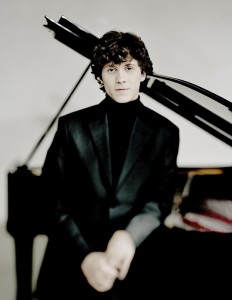UMS Staff Picks: pianist Rafal Blechacz selected by Susie Bozell Craig, Marketing and Corporate Partnerships Manager
SN: Although a relatively young artist, Rafal Blechacz has already established himself as a rising star in the international classical music community. How has he, at only 25 years of age, made his mark in that community and around the world?
SBC: Although he’d won several major piano competitions already, when one wins the Chopin Competition it comes with incredible opportunities. Winning the Gold Medal and all individual prizes in 2005 opened the door for him to perform at Tchaikovsky Hall in Moscow with the Mariinsky Orchestra and Valery Gergiev, at the Concertgebouw in Amsterdam, Wigmore Hall in London, and the Palais des Beaux Arts in Brussels among others. It also helped secure a five-year recording contract with Deutsche Grammophon which has so far resulted in three albums, including perhaps the best recording of Chopin’s Preludes I’ve ever come across.
SN: What “flavor” does he bring to his performance that distinguishes him as such an impressive talent?
SBC: What impresses me so much about Rafal is the incredibly musical maturity he possesses. In many ways, technical prowess is the easy part. But the ability to spin phrases with perfect balance and timing, to not take too many liberties while still drawing out poignancy, the achievement of an incredibly organic result…this takes true mastery. Artists can work for years and still not achieve this.
SN: What are you most looking forward to about his upcoming Ann Arbor performance?
SBC: Chopin is one of my favorite composers for the piano, and to hear a true artist perform his works, which are so romantic with their sense of longing, nostalgia, grief…I think it will be an incredibly emotional experience.
SN: What other events are on your “must see” list for the 10/11 season?
SBC: I’m looking forward to both of the Russian orchestras, the Mariinsky and St. Petersburg, with their blockbuster programs; also Susurrus as a totally unique and intimate experience; and the two Shakespeare plays with Propeller Theater Company, both of which are new to me.
SN: What do you enjoy doing outside of work?
SBC: I’m a pretty active tennis player, and I before I started working at UMS I made a living as a flutist and still enjoy practicing and teaching. My husband and I are also looking forward to the birth of our first child late this fall.
SN: What have you been listening to on your iPod?
SBC: Well, yesterday I listened to Rachmaninoff’s second and third piano concertos in preparation for the season. I’m headed over to Lake Michigan next weekend and that always brings out summertime favorites like Jack Johnson and a quirky folk band from northern Michigan called Third Coast. It’s got a pretty wide array of artists to suit the occasion and mood.
Which pianist featured on the 10/11 season are you most looking forward to hearing?
UMS Announces 10/11 Choral Union Series & Piano Series
The University Musical Society is pleased to announce its 132nd Annual Choral Union Series, with 10 concerts in Hill Auditorium. The series includes:
Mariinsky Orchestra
Valery Gergiev, conductor
Denis Matsuev, piano
Sunday, October 10 | 4 pm
Hill Auditorium
Gergiev’s long association with the Mariinsky Theatre — including 10 UMS appearances, most recently the five-concert cycle of Shostakovich symphonies —has raised the ensemble’s profile to the point where it is now widely regarded one of the most dynamic and exciting ensembles on the world stage today. The fiery Russian pianist Denis Matsuev has received worldwide acclaim for his rare combination of technical virtuosity and deep musicality since his stunning victory at the 11th International Tchaikovsky Competition in Moscow in 1998. “His technique is phenomenal: blistering passagework, steely chords. Perhaps he is the new Horowitz.” (London Times)
Program
Rachmaninoff Piano Concerto No. 3 in d minor, Op. 30
Mahler Symphony No. 5
Venice Baroque Orchestra
Robert McDuffie, violin
Wednesday, October 27 | 8 pm
Hill Auditorium
The Venice Baroque Orchestra was founded in 1997 by harpsichordist Andrea Marcon and is recognized as one of Europe’s premier ensembles devoted to period instrument performance. For this UMS debut, they perform music of their home city — Venetian composer Antonio Vivaldi’s The Four Seasons — paired with an “American Four Seasons” by Philip Glass featuring violinist Robert McDuffie, who has worked closely with Glass over the years and who made his UMS debut with the Jerusalem Symphony in 2008.
Program
Vivaldi The Four Seasons, Op. 8 (1723)
Glass Violin Concerto No. 2: “The American Four Seasons”
Murray Perahia, piano
Wednesday, November 10 | 8 pm
Hill Auditorium
Anyone who has heard one of Murray’s Perahia’s previous 11 UMS appearances would have to agree with the assessment of The Los Angeles Times: “Perahia is a marvel.” In the more than 35 years he has been performing on the concert stage, he has become one of the most cherished pianists of our time. “Perahia may be the closest thing to a pure conduit of music — one in which the imagination and skill of the player are entirely at the service of the composer, not the player’s ego…The soul of a poet, the mind of a thinker, the hands of a virtuoso: No wonder audiences love this guy.” (The Seattle Times)
Program to be announced.
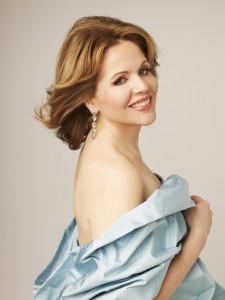 Renée Fleming, soprano
Renée Fleming, soprano
Sunday, January 16 | 4 pm
Hill Auditorium
One of the most beloved and celebrated musical ambassadors of our time, soprano Renée Fleming captivates audiences with her sumptuous voice, consummate artistry, and compelling stage presence. In addition to commanding the stages of the great opera houses of the world, she hosts the Metropolitan Opera’s Live in HD Series for movie theaters and television with behind-the-scenes interviews. Her fame is such that perfumes, desserts, and flowers have all been named after her, but those superficial accolades pale in comparison to her devoted following of opera lovers around the world. This great American soprano returns to UMS after her 1997 recital and her 2005 appearance in a concert version of Richard Strauss’s Daphne.
The Cleveland Orchestra
Franz Welser-Möst, conductor
Pierre-Laurent Aimard, piano
Tuesday, February 1 | 8 pm
Hill Auditorium
Founded shortly after the end of World War I, the Cleveland Orchestra has been guided by seven music directors, each of whom has left his mark on the widely admired “Cleveland” sound: Nikolai Sokoloff, Artur Rodzinski, Erich Leinsdorf, George Szell, Lorin Maazel, Christoph von Dohnányi, and Franz Welser-Möst, who leads the ensemble and the French pianist Pierre-Laurent Aimard in this performance.
Program
Bartók Music for Strings, Percussion, and Celeste, Sz. 106, BB 114
Schumann Piano Concerto in a minor, Op. 54
Wagner Overture to Tannhäuser
Rafał Blechacz, piano
Friday, February 11 | 8 pm
Hill Auditorium
In October 2005, the 20-year-old Rafał Blechacz, an unassuming young man from a small town in northern Poland, arrived in Warsaw for the 15th International Chopin Competition. His sensational performance won not only the competition, but also all four special prizes for the polonaise, mazurka, sonata, and concerto performance — in fact, one of the judges remarked that he “so outclassed the remaining finalists that no second prize could actually be awarded.” Blechacz was the first Pole to win the prize since Krystian Zimerman 30 years earlier. Notwithstanding his young age, his playing offers poetry, maturity, poise and concentration, as well as a phenomenal and luminous technique. “How reassuring it is to see one so young putting poetry first…we were all on another planet.” (Financial Times)
Program to be announced.
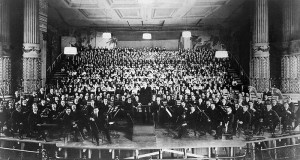 Mahler’s Symphony No. 8
Mahler’s Symphony No. 8
Detroit Symphony Orchestra
UMS Choral Union
U-M Chamber Choir
U-M University Choir
U-M Orpheus Singers
MSU Children’s Choir
Leonard Slatkin, conductor
Saturday, March 19 | 8 pm
Hill Auditorium
In commemoration of the 150th anniversary of Gustav Mahler’s birth and the 100th anniversary of his death, UMS is collaborating with the DSO and Michigan Opera Theatre to present a spectacular, not-to-be-missed performance of Mahler’s monumental Symphony No. 8, also known as “Symphony of a Thousand.” The first performance of this “choral symphony” featured a chorus of about 850, with an orchestra of 171, leading Mahler’s agent to dub to the work “Symphony of a Thousand.” While Mahler himself did not approve of the title, it nevertheless remains associated with this work, which is rarely preformed due to the massive forces required to do it justice.
Bach’s Mass in b minor
Bach Collegium Japan
Masaaki Suzuki, conductor
Thursday, March 24 | 8 pm
Hill Auditorium
Founded in 1990 by Masaaki Suzuki with the aim of introducing Japanese audiences to period instrument performance of great works of the Baroque period, the Bach Collegium Japan comprises both orchestra and chorus. The group has developed a formidable reputation through its recordings of J.S. Bach’s church cantatas, and returns to Ann Arbor after its 2003 St. Matthew Passion in St. Francis of Assisi Catholic Church. Widely regarded as one of the supreme achievements in classical music, the Mass in b minor was composed over a period of 25 years and assembled in its present form in 1749, the year before Bach died. “I have never heard period instruments played with such purity of tone, so reliably in tune. The small, precise, dramatically alert chorus breathed fire but also revealed a heartbreaking tenderness.” (The Los Angeles Times)
St. Petersburg Philharmonic
Yuri Temirkanov, conductor
Nikolai Lugansky, piano
Saturday, April 2 | 8 pm
Hill Auditorium
The Russian city of St. Petersburg boasts two world-class orchestras, and UMS has enjoyed a long relationship with each. The St. Petersburg Philharmonic has appeared in Ann Arbor five times under Yuri Temirkanov’s leadership. With a history dating back more than 200 years, the St. Petersburg Philharmonic is embedded with musical history, performing the world premiere of Beethoven’s Missa Solemnis in 1824, as well as Tchaikovsky’s Symphony No. 6, Prokofiev’s Symphony No. 1, and many works by Shostakovich. Pianist Nikolai Lugansky, who won the 1994 Tchaikovsky Piano Competition, makes his UMS debut. A Russian newspaper said of his performance in the final round of competition: “It was like getting sunstroke, a musical shock. Nobody could imagine that the soul of this unpretentious, modest young man, with his ascetic, but also poetic appearance, held such a volcano inside with inspired and resolute control.”
Program
Rimsky-Korsakov Scheherazade, Op. 35
Rachmaninoff Piano Concerto No. 2 in c minor, Op. 18
Liebeslieder Waltzes
Genia Kühmeier, soprano
Bernarda Fink, mezzo-soprano
Michael Schade, tenor
Thomas Quasthoff, bass-baritone
Malcolm Martineau, piano
Justus Zeyen, piano
Saturday, April 23 | 8 pm
Hill Auditorium
After nearly a decade in which he composed no vocal music at all, Schumann made a striking return to the genre with the Spanisches Liebeslieder song collection, which combines songs for solo voice with duets and quartets. A generation later, Brahms took the same instrumentation — vocal quartet plus four-hand piano —and composed the Liebeslieder and Neue Liebeslieder Waltzes. These three works serve the centerpiece of a program that also includes Brahms’ composition for vocal quartet and piano, performed by a brilliant quartet of musicians, including bass-baritone Thomas Quasthoff, who last appeared at UMS in a Lydia Mendessohn Theatre recital in 2000.
Program
Schumann Spanische Liebeslieder, Op. 138
Brahms Liebeslieder Waltzes, Op. 52
Brahms Four Songs from Quartets for Four Voices and Pianos, Ops. 64 & 92
Brahms Neue Liebeslieder Waltzes, Op. 65
Tickets for the 10-concert series range from $100-$650. Subscription renewal packets and brochures will be mailed in early May.
In addition to the 10-concert Choral Union Series, five events listed above will be packaged as a Piano Series (Kirov Orchestra with Denis Matsuev, Murray Perahia, Cleveland Orchestra with Pierre-Laurent Aimard, Rafał Blechacz, and St. Petersburg Philharmonic with Nikolai Lugansky). Prices for the five-concert Piano Series range from $50-$310.
Tickets to individual events on the series go on sale on Monday, August 23 (via www.ums.org) and Wednesday, August 25 (in person and by phone).
Which events in the season are you most anticipating? Let us know in the comments area below.
10/11 Chamber Arts Series & Schubertiade Announced
The 48th Annual UMS Chamber Arts Series presents some of today’s leading chamber musicians performing both traditional and contemporary repertoire:
Schubert Cycle Concert 1
Takács Quartet
Jeffrey Kahane, piano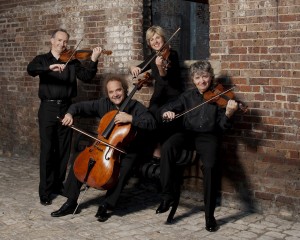
Thursday, October 14 | 8 pm
Rackham Auditorium
The always superlative Takács Quartet has become an Ann Arbor favorite over the past decade, consistently delivering performances that live well beyond the last note played in the concert hall. In the 10/11 season, they perform a three-concert cycle of Schubert’s quartets and quintets, with the first performance launching the Chamber Arts Series. Commenting on their latest Schubert recording for Hyperion, Gramophone magazine noted, “The Takács have the ability to make you believe that there’s no other possible way the music should go, and the strength to overturn preconceptions that comes with only the greatest performers.” This first concert features pianist Jeffrey Kahane, and balances two Schubert string quartets with the young American composer Daniel Kellogg’s Variations on “Death and the Maiden.”
Program
Schubert String Quartet in E-flat Major, D. 87
Schubert Piano Sonata in B-flat Major, D. 960 (Op. Post.)
Daniel Kellogg Variations on a Theme from “Death and the Maiden”
Schubert String Quartet in d minor, D. 810
Jerusalem Quartet
Thursday, October 21 | 8 pm
Rackham Auditorium
“Superlatives are inadequate in describing just how this playing was from one of the young, yet great, quartets of our time.” (The Strad) Returning after its widely acclaimed UMS visit in 2007, the Jerusalem Quartet was formed in 1993, when its members were still teenagers, within the framework of the Young Musicians’ Group under the auspices of the Jerusalem Music Centre and the America Israel Cultural Foundation. “Musical electricity may be unfathomable, but one thing is for sure — they have it.” (The Strad)
Program
Mendelssohn Quartet in e minor, Op. 44, No. 2
Mark Kopytman String Quartet No. 3 (1969)
Brahms Quartet in c minor, Op. 51, No. 1
The Historic Concert
ONCE.MORE Festival:
A 50th Anniversary Moment
Tuesday, November 2 | 8 pm
Rackham Auditorium
The ONCE Group was a collection of musicians, visual artists, architects, and film-makers who wished to create an environment in which artists could explore and share techniques and ideas in the late 1950s and early 1960s. The group hosted the ONCE Festival six times in Ann Arbor in the early 1960s; one of the enduring outcomes of this group is the Ann Arbor Film Festival. The organizers of the ONCE festival were five composition students of U-M composition professor Ross Lee Finney, whose sabbatical in Europe resulted in a revolution of sorts among his students, who began using electronics in their compositions. This concert represents the historic works presented during Ann Arbor’s ONCE Festival some 50 years ago; a second concert, presented two days later (and not on the Chamber Arts Series), will look at more recent works by the same composers. This special collaboration with the U-M School of Music, Theatre & Dance will provide a look into Ann Arbor’s progressive role in the development of avant-garde music.
Program
Roger Reynolds Mosaic for Flute and Piano (1962)
Robert Ashley in memoriam…Crazy Horse (1963)
Gordon Mumma Large Size Mograph (1962)
Donald Scavarda Group for Piano (1959)
Robert Ashley in memoriam…Esteban Gomez (1963)
Donald Scavarda FilmSCORE for Two Pianists (1962)
Donald Scavarda GREYS, A FilmSCORE (silent version) (1963)
Scavarda/Mumma GREYS, A FilmSCORE (with sound) (1963)
Gordon Mumma Sinfonia (1958-60)
Donald Scavarda Matrix for Clarinetist (1962)
Roger Reynolds A Portrait of Vanzetti (1962-63)
Nadja Salerno-Sonnenberg, violin
New Century Chamber Orchestra
Friday, February 4 | 8 pm
Rackham Auditorium
Electrifying performances, fearless interpretations, and musical depth have established the violinist Nadja Salerno-Sonnenberg as one of the leading violinists of our time. She was born in Rome and immigrated to the United States at the age of eight to study at The Curtis Institute of Music, beginning her professional career in 1981 when she became the youngest person ever to win the Walter W. Naumburg International Violin Competition. For the past two years, she has served as music director of San Francisco’s New Century Chamber Orchestra, which makes its UMS debut with a program that includes Astor Piazzolla’s Four Seasons of Buenos Aires, a tango-inspired version that complements the Vivaldi and Philip Glass “Four Seasons” on the Choral Union Series.
Program
Wolf/arr. Drew Italian Serenade (1887)
Bartók/Willner Romanian Folk Dances
Piazzolla Four Seasons of Buenos Aires (1964-70)
Tchaikovsky Serenade for Strings in C Major, Op. 48
Concertante and Rafał Blechacz, piano
Sunday, February 13 | 4 pm
Rackham Auditorium
Comprised of a core of six virtuoso string players, Concertante performs in varied combinations of instrumentalists with a sheen, warmth, and polish that are the hallmark of superb chamber music groups. For this concert, they are joined the Polish pianist Rafał Blechacz, who performs in recital on the Choral Union Series two nights earlier, for a chamber arrangement of Chopin’s Piano Concerto No. 1, written when the composer was only 20 years old. Blechacz is widely regarded as a supreme interpreter of Chopin’s works, sweeping all five first prizes at the 2005 International Chopin Competition when he was just 20, the first Pole to achieve the honor since Krystian Zimerman in 1975.
Program
Elgar Serenade for Strings in e minor, Op. 20
Schoenberg Verklärte Nacht, Op. 4
Chopin Piano Concerto No. 1 in e minor, Op. 11
Scharoun Ensemble Berlin
Chamber Musicians of the Berlin Philharmonic
Wednesday, March 9 | 8 pm
Rackham Auditorium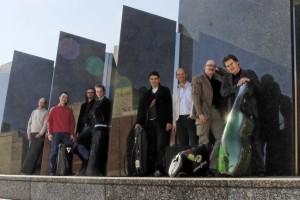
In 1983, members of the Berlin Philharmonic founded the Scharoun Ensemble Berlin, named after the architect who designed the marvelous concert hall where the Berlin Philharmonic performs at home. The eight musicians of the Scharoun Ensemble express an artistic commitment to both the heritage of the past and the challenges of the present. The ensemble comprises the standard octet instrumentation — clarinet, horn, bassoon, two violins, viola, cello, and double bass —allowing them to perform some of the great chamber music literature of Schubert, Mozart, Beethoven, and Brahms, in addition to 20th-century classical modernist works and contemporary music.
Program
Schubert Octet in F Major, D. 803
Additional works to be announced.
Tetzlaff Quartet
Saturday, April 9| 8 pm
Rackham Auditorium
The terrific German violinist Christian Tetzlaff, who most recently appeared with as soloist with the San Francisco Symphony, in addition to solo recital appearances at both St. Francis of Assisi Catholic Church and Hill Auditorium, brings his chamber ensemble, the Tetzlaff Quartet. The group was founded in 1994 by Tetzlaff and his sister, Tanja, along with two musicians with a mutual devotion to chamber music whom they met at a chamber music festival in Switzerland. Despite reduced availability, they make a commitment to perform each year as a quartet, drawing accolades from critics and casual listeners alike.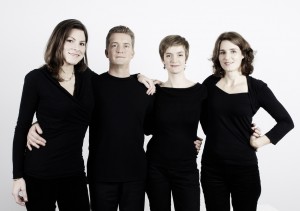
Program
Haydn Quartet in g minor, Op. 20, No. 3
Mendelssohn Quartet in a minor, Op. 13
Sibelius Quartet in d minor, Op. 56 ”Voces Intimae” (1909)
Schubertiade Series
The always superlative Takács Quartet has become an Ann Arbor favorite over the past decade, consistently delivering performances that live well beyond the last note played in the concert hall. In the 10/11 season, they perform a three-concert cycle of Schubert’s quartets and quintets (Thursday, October 14; Sunday, February 20; and Friday, April 8).
Schubert Cycle Concert 2
Takács Quartet
Sunday, February 20| 4 pm
Rackham Auditorium
Program
Schubert String Quartet in B-flat Major, D. 112
Schubert String Quartet in a minor, D. 804
Schubert String Quartet in G Major, D. 887
Schubert Cycle Concert 3
Takács Quartet
Jeffrey Kahane, piano
Paul Katz, cello
John Feeney, double bass
Friday, April 8 | 8 pm
Rackham Auditorium
Program
Schubert Piano Quintet in A Major, D. 667 (“Trout”)
Schubert Cello Quintet in C Major, D. 956
Tickets for the 7-concert series range from $124-$256. Subscription renewal packets and brochures will be mailed in early May.
An additional option that includes all three Schubert concerts by the Takács Quartet (nine concerts total) ranges from $170-$340.
Tickets to individual events on the series go on sale on Monday, August 23 (via www.ums.org) and Wednesday, August 25 (in person and by phone).
Which events in the season are you most anticipating? Let us know in the comments area below.
The always superlative Takács Quartet has become an Ann Arbor favorite over the past decade, consistently delivering performances that live well beyond the last note played in the concert hall. In the 10/11 season, they perform a three-concert cycle of Schubert’s quartets and quintets, with the first performance launching the Chamber Arts Series. Commenting on their latest Schubert recording for Hyperion, Gramophone magazine noted, “The Takács have the ability to make you believe that there’s no other possible way the music should go, and the strength to overturn preconceptions that comes with only the greatest performers.” This first concert features pianist Jeffrey Kahane, and balances two Schubert string quartets with the young American composer Daniel Kellogg’s Variations on “Death and the Maiden.”


